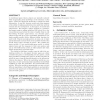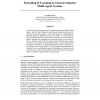250 search results - page 37 / 50 » Learning action effects in partially observable domains |
ICML
2000
IEEE
16 years 15 days ago
2000
IEEE
Machine learning research has been very successful at producing powerful, broadlyapplicable classification learners. However, many practical learning problems do not fit the class...
100
click to vote
SIGECOM
2006
ACM
15 years 5 months ago
2006
ACM
In traditional game theory, players are typically endowed with exogenously given knowledge of the structure of the game—either full omniscient knowledge or partial but fixed in...
104
click to vote
NIPS
2003
15 years 1 months ago
2003
Recent multi-agent extensions of Q-Learning require knowledge of other agents’ payoffs and Q-functions, and assume game-theoretic play at all times by all other agents. This pap...
100
click to vote
GPEM
2008
14 years 11 months ago
2008
In this work a cooperative, bid-based, model for problem decomposition is proposed with application to discrete action domains such as classification. This represents a significan...
AAAI
2012
13 years 2 months ago
2012
Many strategic actions carry a ‘contagious’ component beyond the immediate locale of the effort itself. Viral marketing and peacekeeping operations have both been observed to ...


